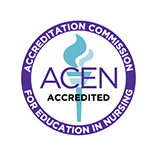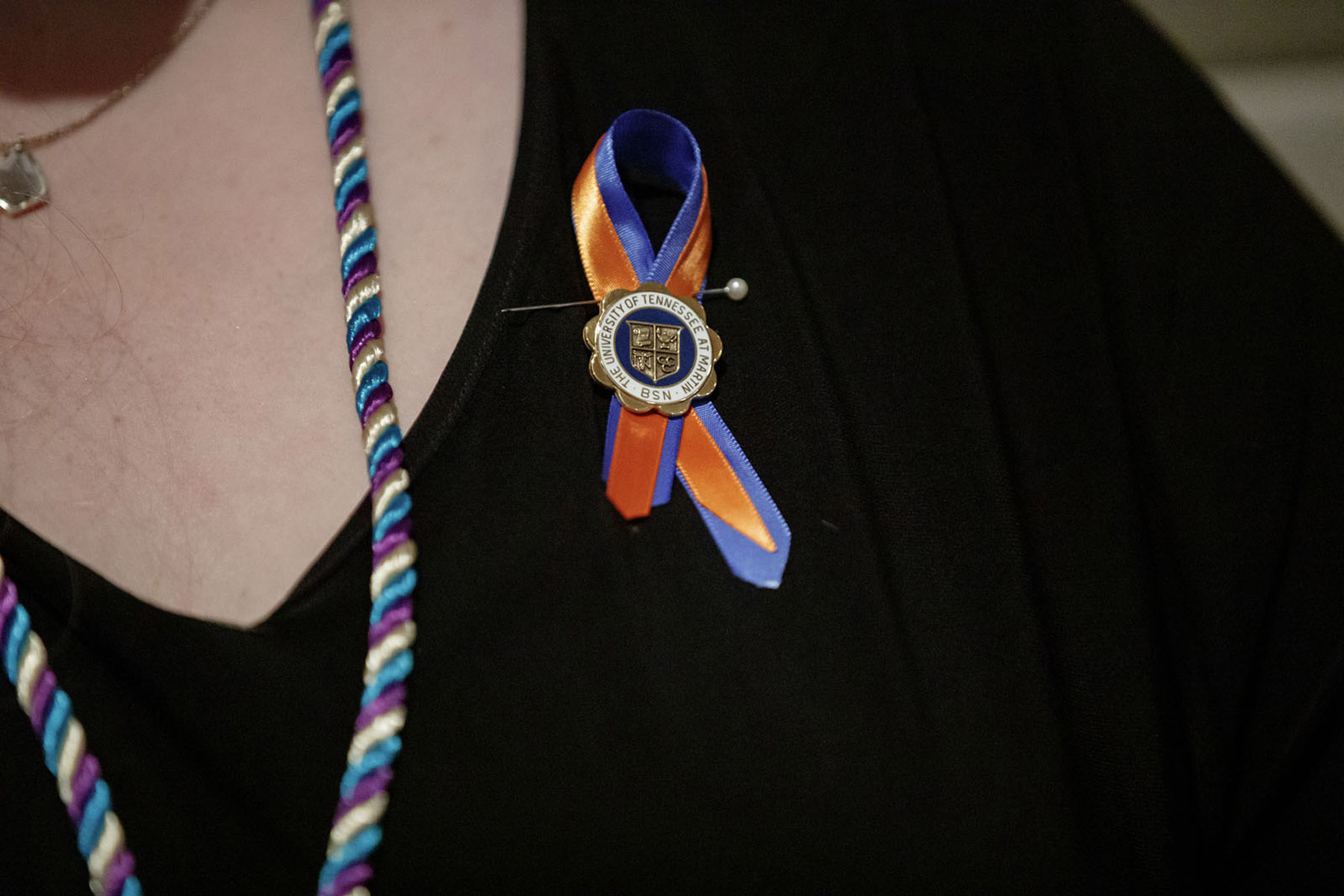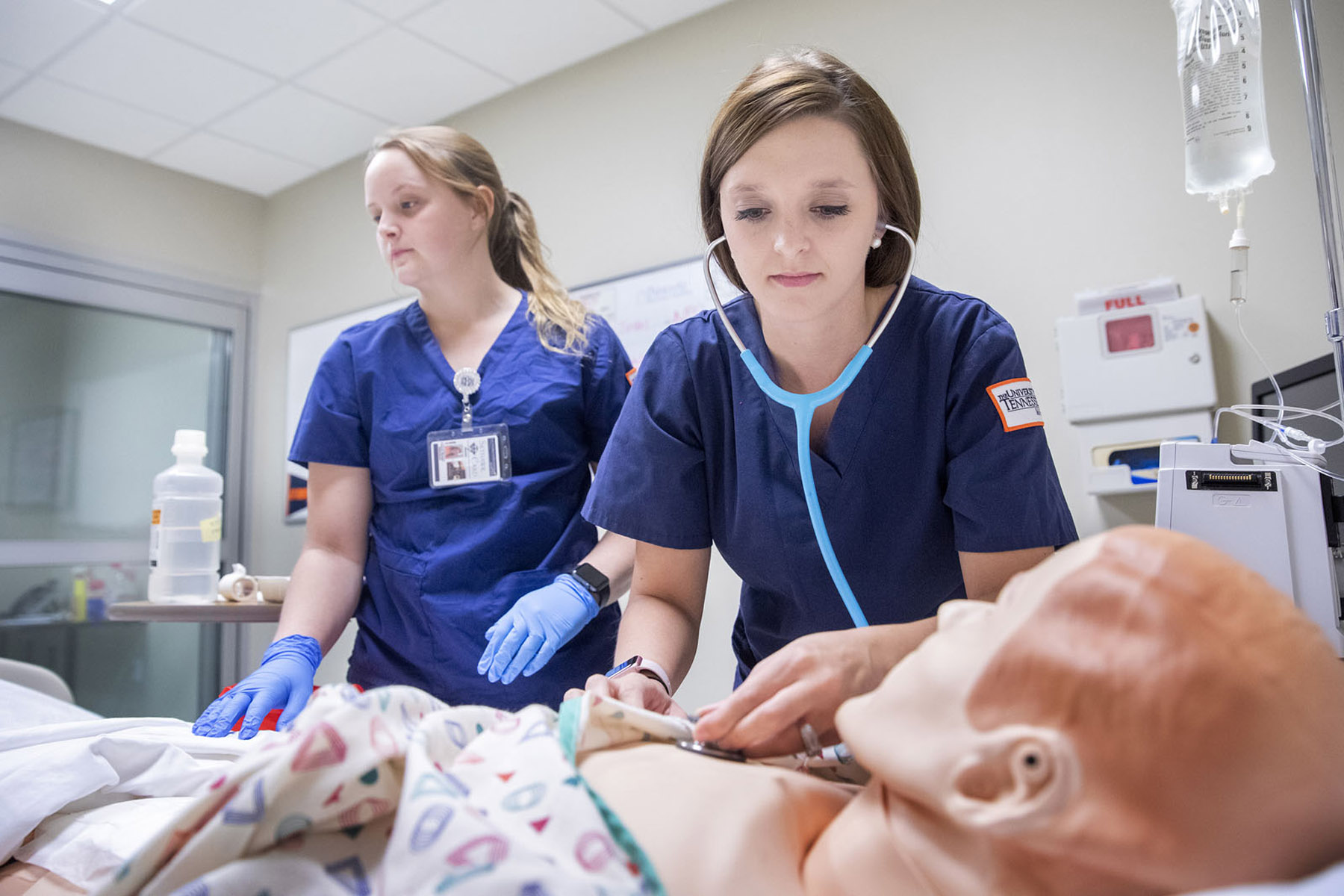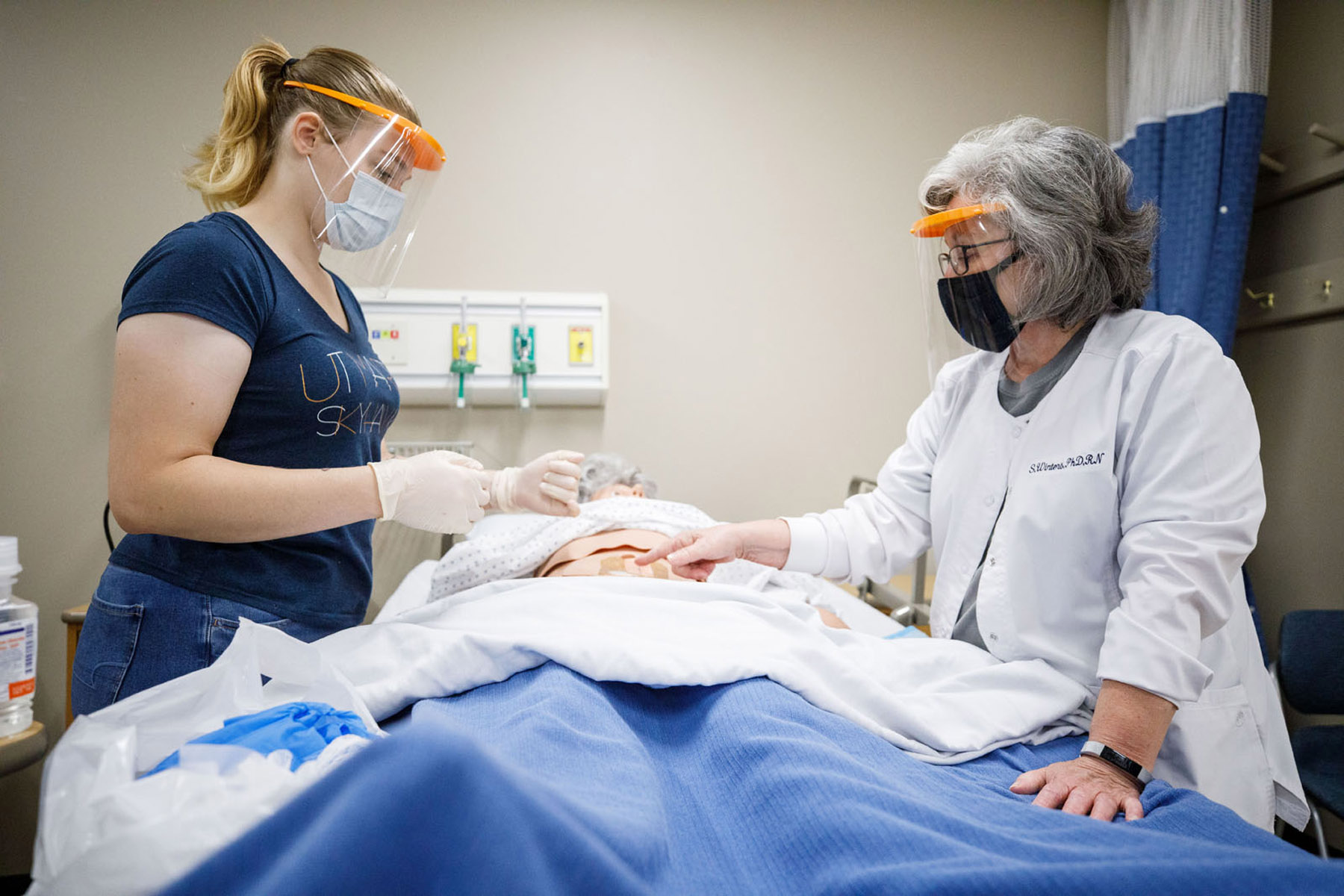Nurses have a powerful impact in the lives of the patients they serve. This rewarding and relevant field of study is an excellent choice if you're looking for a career that will allow you to make a difference from day one. At UT Martin, our nursing program emphasizes real-world, hands-on learning experiences that will give you the skills you need to soar in this meaningful profession.
The baccalaureate nursing program at the University of Tennessee at Martin located in Martin, TN and also offered at the UTM Parsons Center in Parsons, TN is accredited by the:
Accreditation Commission for Education in Nursing (ACEN)
3390 Peachtree Road NE, Suite 1400 Atlanta, GA 30326
The most recent accreditation decision made by the ACEN Board of Commissioners for the baccalaureate nursing program is continuing accreditation.

Application Deadline: February 15 (Fall entry)
Application Deadline Extended: March 6 (Fall 2026 entry)
*Be admitted to the University of Tennessee at Martin as a degree-seeking undergraduate student.
*Minimum cumulative college GPA of 2.75
*Composite ACT score of 21 OR a Reading subscore of 20 or higher are required. Note: If the ACT score is self-reported, student must go to the ACT website, create an account, download the official score, and attach as a pdf to application for clinical nursing program.
*Minimum GPA and ACT requirements apply to all students declaring the BSN major including first-year, readmission, and transfer students. These requirements do not apply to RN-BSN applicants.
*Prerequisite Courses: Math 140 or Math 100 and110, Psychology 101, Microbiology 251, Zoology 251, Zoology 352 or the equivalent of these courses are required.
*A minimum grade of “C” is required in all prerequisite courses. One science prerequisite course may be repeated only once; if repeated, the second earned letter grade of the repeated course will be used in the GPA calculation regardless if grade is higher or lower. Science Courses that are seven years or older will not be transferrable. This does not apply to RN-BSN applicants.
*Students who are transferring from another nursing program must submit a letter of good standing from the Dean/Director of the previous nursing program. Transfer applicants with less than a grade of “C” in two Nursing courses will not be eligible. This includes repeated Nursing courses in which a grade above “C” was earned.
*Candidates may be required to complete an interview process.
*The ATI TEAS is the required pre-admission test for entrance into the clinical nursing program. Total scores for the TEAS are reported as levels, and a total score at the PROFICIENCY LEVEL of achievement is the minimum acceptable level for candidates applying to the nursing program. The TEAS can be taken a maximum of two times for one application cycle. Applicants will be ranked based upon the highest total percentile score in case of identical scores. The TEAS test is not required for applicants to the RN-BSN program.
*If indicated, TOEFL scores are required for non-native English speakers seeking admission to BSN Program or RN-BSN Program at the University of Tennessee at Martin. Applicants must achieve a TOEFL score of at least 80 on the internet-based test if their native language is not English. A minimum speaking score of 26 is also required. Official scores are required prior to admission and must be completed within two years of admission to the nursing program. There is no English language conditional admittance available.
Admission Application to the Clinical Nursing Program Apply Here
Re-Admission Application to the Clinical Nursing Program Apply Here
Note: All clinical nursing students must add a Kaplan Test fee before the beginning of each semester.
Liability Insurance payment - add annual charge to account manually, beginning July 15th each year. You must also send a copy of your account charge to Amy Davidson (adavid18@utm.edu) as proof of coverage.
This list does not include student costs incurred for travel to/from clinical, personal health insurance coverage, and physical exam, immunizations, screenings, and titers required for admission and retention. All costs subject to change.
All students must complete the following as a condition of acceptance into the Clinical Nursing Program:
RN to BSN Option Students already licensed as Registered Nurses may complete the B.S.N. degree program and meet the general requirements for a bachelor's degree as follows:
The faculty of the Department of Nursing accepts the philosophy of The University of Tennessee at Martin supporting the goal to educate and engage responsible citizens to lead and serve in a diverse world.
The Department of Nursing's mission is to prepare caring, compassionate, professional nurse generalists committed to advancing the profession of nursing through leadership and service in diverse healthcare communities and the world.
The Department of Nursing believes a professional nurse is committed to making safe clinical judgments supported by evidence to implement patient-centered care for diverse individuals, families and groups across the lifespan. The nurse considers patients' self-identified, unique and individual preferences to provide optimal collaborative and compassionate care. The professional nurse utilizes concepts of informatics and technology, quality improvement, and health promotion in leadership roles in various healthcare systems (AACN, 2008; NCSBN, 2015; QSEN, 2015).
The faculty of the department of Nursing at The University of Tennessee at Martin believe:
Patient-centered care (PCC) includes recognizing the patient or designee as the source of control and full partner in providing compassionate and coordinated care based on respect for patient's preferences, spiritual and cultural values, and needs (QSEN, 2015).
Evidence-based practice (EBP) is the process of integrating best current evidence with clinical expertise and patient/family preferences and values for delivery of optimal health care (QSEN, 2015). Clinical judgment is using evidence-based practice to make decisions within the care setting. Professional nursing practice is grounded in the translation of current evidence into one's practice (AACN, 2008).
Teamwork and collaboration (TC) occur when the nurse functions effectively within nursing and interprofessional teams, fostering open communication, mutual respect, and shared decision making to achieve quality patient care (QSEN, 2015). Communication and collaboration among healthcare professionals are critical to delivery high quality and safe patient care (AACN, 2008).
Safety (S) minimizes risk of harm to patients and providers through both system effectiveness and individual performance (QSEN, 2015). Safe performance of nursing care is considered foundational for the professional nurse and is essential to provide high quality health care (AACN, 2008).
Quality improvement (QI) is the process of using data to monitor the outcomes of care processes and use improvement methods to design and test changes to continuously improve the quality and safety of health care systems (QSEN, 2015). Knowledge and skill in quality improvement is necessary to provide high quality health care (AACN, 2008).
Professionalism (P) and the inherent values of altruism, autonomy, human dignity, integrity and social justice are fundamental to the discipline of nursing (AACN, 2008). As professionals, nurses use a well-delineated and broad knowledge base for practice. Professional nursing requires strong critical reasoning, clinical judgment, communication and assessment skills. Baccalaureate nurse generalists are members of the profession and in this role are advocates for the patient and the profession (AACN, 2008).
Informatics (IT) involves the use of information and technology to communicate, utilize knowledge management, mitigate error, and support decision making (QSEN, 2015). Knowledge and skills in information management and patient care technology are critical in the delivery of quality patient care (AACN, 2008).
Leadership (L) skills of the baccalaureate nurse generalist emphasize ethical and critical decision making, initiating and maintaining effective working relationships, using mutually respectful communication and collaboration within interprofessional teams, care coordination, delegation, and developing conflict resolution strategies (AACN, 2008).
Health promotion (HP) is the process of enabling people to increase control over, and to improve, their health. It moves beyond a focus on individual behavior towards a wide range of social and environmental interventions (WHO, 2015). Health promotion and disease prevention at the individual and population level are necessary to improve population health and are important components of baccalaureate generalist nursing practice (AACN, 2008).
Fifty-five percent (55%) of students who begin in the baccalaureate program will complete on time-- (pre-licensure students within six semesters; RN-BSN completion students within four semesters).
| Graduation Year | Pre-Licensure: Martin Campus | Pre-Licensure: Parsons Center | RN-BSN | Overall |
| 2018 | 48% | 30% | 77.30% | 49% |
| 2019 | 40% | 41% | 84% | 50.50% |
| 2020 | 44% | 75% | 58% | 55% |
| 2021 | 40.80% | 61.90% | 55.60% | 48.10% |
| 2022 | 50% | 57% | 45.50% | 51.65% |
| 2023 | 38.60% | 54.50% | 42.90% | 43% |
| 2024 | 70.8% | 70% | 45% | 67.6% |
| 2025 | 60% | 58.3% | 61.5% | 60% |
At least 80% of graduates will pass the NCLEX-RN on the first attempt.
| Graduation Year | Martin Campus | Parsons Center | Overall | Tennessee | Nation |
| 2018 | 100% | 100% | 100% | 92.18% | 88.30% |
| 2019 | 100% | 90.90% | 96.88% | 92.37% | 88.18% |
| 2020 | 100% | 93.30% | 97.06% | 91.67% | 86.58% |
| 2021 | 95% | 76.90% | 87.88% | 87.65% | 82.48% |
| 2022 | 100% | 87.50% | 95.23% | 86.07% | 79.91% |
| 2023 | 95.45% | 100% | 97.05% | 93.22% | 88.56% |
| 2024 | 97% | 100% | 97.56% | 94.89% | 91.16% |
| 2025 | 96.67% | 100% | 97.29% |
Ninety percent (90%) of graduates will be employed as an RN within 3-6 months of graduation.
| Graduation Year | Overall |
| 2018 | 100% |
| 2019 | 100% |
| 2020 | 100% |
| 2021 | 96.7% |
| 2022 | 100% |
| 2023 | 100% |
| 2024 | 100% |
| 2025 | 100% |




“I love that UT Martin is a small campus community filled with amazing opportunities. ”


